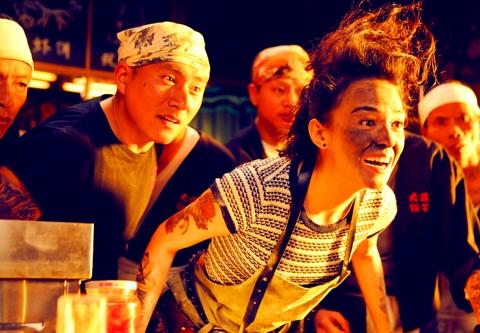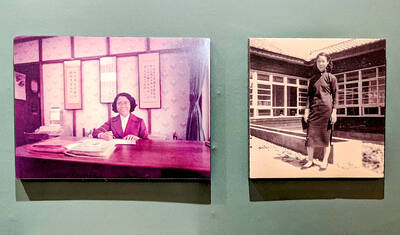Watching See You Tomorrow (擺渡人) is like partaking in one of the extreme alcohol challenges featured in the film. You’re having the time of your life even though nothing is really making sense anymore, and the party rages on at full throttle as shot after shot comes in. It only gets better as your consciousness starts to fade … and you wake up with a horrible hangover wondering what the hell happened.
There’s little substance to this film, which runs on pure adrenaline and dopamine in a purposely over-the-top world where drinking 50 shots of Siberian vodka within a minute is just one event over a wild night. The humor is mostly slapstick or culture-specific, with nods to many past films and the latest pop phenomena and sayings in the Chinese-speaking world — typical of your local Lunar New Year blockbuster that is not meant to garner much attention outside of Asia. Don’t be surprised that it’s produced by Wong Kar-wai (王家衛) — the arthouse legend has done this before with the screwball comedy The Eagle Shooting Heroes (東成西就), which premiered during the holidays in 1993.
First-time director Zhang Jiajia (張嘉佳), who adapted the script from his own short story, pronounced it a “Wong Kar-wai film story told in a Stephen Chow (周星馳) manner.” But it leans too much toward Chow’s nonsensical comedic style. We can see his efforts to emulate Wong from the visual stylings to the themes of yearning and unrequited love, but the dialogue is trite, the ideas are shallow and the emotional pull does not even come close to a “genuine” Wong flick.

Photos courtesy of atmovies.com
Chow’s productions are usually fun to watch, and so is See You Tomorrow, with its crazy characters and their shenanigans along with the ultra-glitzy and splashy visuals. But in the end, it’s just a temporary distraction to the glaring plot holes, cheap story gimmicks and lack of depth due to cramming too much into one film. We know that things aren’t supposed to make sense in these types of films, but at least we should leave feeling that there was some sort of resolution — even if it is everyone lives happily ever after.
Not here, as we don’t really know what any of the main characters gained out of the events. The whole premise is based on Tony Leung’s (梁朝偉) role as a “ferryman,” who is hired to guide those who are drowning emotionally to the “shore.” The problem is the film is so bogged down by the characters’ wacky hijinks that we don’t actually see him seriously at work until halfway through the film.
And even then, the way people are “saved” in the film is trivial and childish — for example, Leung “helps” a fat lady whose groom ran away on wedding day get over her heartbreak by starving her for 48 hours and diverting her attention to food. It appears that in this world, people can just turn their lives over by one simple event. And in the end, there is no epiphany for Leung or his protege Xiaoyu (楊穎, Angelababy). Nor for any of the other “main” characters, of which only Guanchun (Kaneshiro Takeshi, 金城武) gets significant screen attention with an even more ridiculous backstory.
On that note, Kaneshiro should be applauded as he plays probably the most extreme character in the movie with gusto. Leung is a bit disappointing, but part of it may have to do with his incessant switching between Cantonese and Mandarin (and sometimes English), which is the most puzzling part of the film. It’s not just Leung — all Hong Kong-based actors do this constantly and often several times within one sentence. There is one scene where a character speaks exclusively in Cantonese while his sister only speaks Mandarin, and it’s as if the director thinks that speakers of the two languages can automatically understand each other.
Perhaps it is to appeal to audiences across Taiwan, Hong Kong and China as the soundtrack also includes several Hoklo (also known as Taiwanese) classics. But the story is set in Shanghai, everyone is obviously fluent in Mandarin and this effort in “inclusion” only makes things even more jarring than they already are.

Following the shock complete failure of all the recall votes against Chinese Nationalist Party (KMT) lawmakers on July 26, pan-blue supporters and the Chinese Communist Party (CCP) were giddy with victory. A notable exception was KMT Chairman Eric Chu (朱立倫), who knew better. At a press conference on July 29, he bowed deeply in gratitude to the voters and said the recalls were “not about which party won or lost, but were a great victory for the Taiwanese voters.” The entire recall process was a disaster for both the KMT and the Democratic Progressive Party (DPP). The only bright spot for

Aug. 11 to Aug. 17 Those who never heard of architect Hsiu Tse-lan (修澤蘭) must have seen her work — on the reverse of the NT$100 bill is the Yangmingshan Zhongshan Hall (陽明山中山樓). Then-president Chiang Kai-shek (蔣介石) reportedly hand-picked her for the job and gave her just 13 months to complete it in time for the centennial of Republic of China founder Sun Yat-sen’s birth on Nov. 12, 1966. Another landmark project is Garden City (花園新城) in New Taipei City’s Sindian District (新店) — Taiwan’s first mountainside planned community, which Hsiu initiated in 1968. She was involved in every stage, from selecting

Water management is one of the most powerful forces shaping modern Taiwan’s landscapes and politics. Many of Taiwan’s township and county boundaries are defined by watersheds. The current course of the mighty Jhuoshuei River (濁水溪) was largely established by Japanese embankment building during the 1918-1923 period. Taoyuan is dotted with ponds constructed by settlers from China during the Qing period. Countless local civic actions have been driven by opposition to water projects. Last week something like 2,600mm of rain fell on southern Taiwan in seven days, peaking at over 2,800mm in Duona (多納) in Kaohsiung’s Maolin District (茂林), according to

As last month dawned, the Democratic Progressive Party (DPP) was in a good position. The recall campaigns had strong momentum, polling showed many Chinese Nationalist Party (KMT) lawmakers at risk of recall and even the KMT was bracing for losing seats while facing a tsunami of voter fraud investigations. Polling pointed to some of the recalls being a lock for victory. Though in most districts the majority was against recalling their lawmaker, among voters “definitely” planning to vote, there were double-digit margins in favor of recall in at least five districts, with three districts near or above 20 percent in